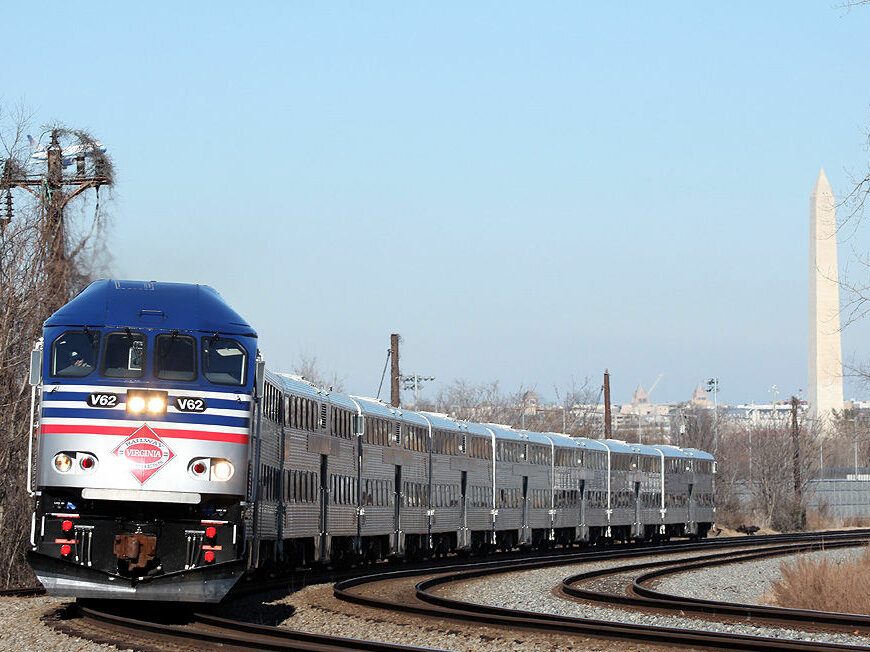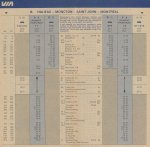This idea got stuck in my head on Monday and has since consumed a non-trivial portion of my holiday. Riverside presents...
overnight sleeper services for Boston.
What Do I Mean By "Overnight"?
For my purposes, I'm defining "overnight service" to mean "boarding in the evening in one city, sleeping aboard, and disembarking in a new city not long after waking." Like a red-eye, you save on overnight accommodations and don't waste daytime hours traveling. With a red-eye, you usually pay for those benefits at the cost of comfort and -- if we're honest -- any decent amount of sleep. An overnight train service will usually have those same costs, although the comfort may be a bit higher, and the cost of a more comfortable seat (e.g. business class) might be a touch lower.
But overnight trains have a couple of notable differences. First, even when just traveling in coach seats, you generally get a one-seat ride. For example, some red-eyes require a late-night or very early-morning transfer to reach your destination; even if you're lucky enough to get comfortable on the first leg, you have to start all over on the second. Second, it is possible to get an actual bed and privacy on an overnight train that you basically cannot get on a plane without paying a four-digit sum.
Finally, depending on the particulars, there are certain journeys that
can be accomplished relatively quickly through air travel, but which take
just long enough, especially when airport overhead travel time is accounted for, that they can still cost you most of a day. Some of those journeys could instead be accomplished with overnight rail with less overall disruption to one's week.
Additionally, there is the growing public awareness of the carbon impact of air travel, which may lead to renewed interest in alternate methods for medium-distance journeys.
Current Services
As it is, Boston currently has what might count as "one and half" overnight services -- depending on how you count them.
Northeast Regional
Trains 65 and 67 leave Boston at 9:30PM. The arrival time to New York is really too early to count as "overnight", since you still get there right in the middle of the night (2:30 AM). However, once you get to Philadelphia (4:30 AM), you just start to slip into "overnight" territory. Certainly journeys to Washington (6:30 AM) or Richmond (9:00 AM) would count (9 hours and 11.5 hours, respectively).
I'd say the Northeast Regional counts as somewhere between one-half and one overnight service. The biggest challenge is that there never is the option of sleeping accommodations on this train. I suspect that this is because -- being the Northeast Corridor -- Boston-Washington (or BOS-PHL or Boston-VA) journeys have a lot of options already. Between cars, buses, trains and flying, you basically can leave Boston any time you want and arrive in Washington as quickly as you are willing to pay for.
Likewise, I think there would be low-demand for sleeping accommodations on this corridor -- in its current form -- because of its length. Leaving Boston at 9:30 is manageable enough, but even by the time you get to Providence (10:22), you're starting to push the convenience level -- it's getting late. And certainly by the time you hit southern Rhode Island, it's basically already 11pm -- if you're going to be traveling at this hour, it's officially a Hassle™, so why not fly and get there faster? There are so many options on this corridor.
(The northbound equivalent Train 66 fares only a little better -- Washington at 9:40, Baltimore at 10:25, but 11:16 by the time you get to Wilmington.)
This means that the only market is Boston/Providence to Washington/Baltimore -- hardly an underserved market, especially given that BWI is a hub for Southwest.
So, unless Amtrak wants to try to rake in some cash by selling First Class tickets and hooking a Viewliner onto 65/66/67, sleeper accommodations seem unlikely for this corridor.
Lake Shore Limited
Train 449 leaves Boston at 12:50PM, combines with 49 at Albany from which it departs at 7:05PM, and arrives in Chicago the next day at 9:50AM. Certainly from Albany onward, this counts as an "overnight", but adding on the 6 hours at the start from Boston is brutal. And, it's worth adding, that 9:50 arrival in Chicago is definitely pushing the convenience level, as it definitely eats into your day (and that's
before any delays on this 1,000 mile journey). So, from a Boston perspective, this is also probably not a proper "overnight" service.
Unlike the Northeast Regional, the Lake Shore Limited does offer sleeper accommodations. A one-way ticket from Boston to Chicago for a roomette is roughly $400. By comparison, a flight from Boston to Chicago, plus a hotel in Downtown Chicago is between $200 and $370, depending on economy vs business, and whether you check bags. Plus add $40 to reach downtown from the airport by cab.
So, for a business traveler who can sacrifice half of her time in the office on Tuesday, the cost for an overnight Amtrak might be just comparable to flight + hotel if she needs to be in Downtown Chicago for a mid-day meeting on Wednesday. (Barely.) To be fair to Amtrak -- if our traveler opted for air instead of rail, she would either need to chop off a few hours of her workday for a 5pm flight out of Logan, or would need to do a late (10pm CT) arrival into Chicago, probably not reaching hotel until close to 11pm CT/midnight ET. An Amtrak roomette won't be as comfortable as a hotel room, but at least you can be in bed at a reasonable hour.
The other variable to note here: on average, Train 49 is 45 minutes late into Chicago, according to
the Amtrak Status Maps Archive Database. A delayed flight will keep you from getting to bed, but won't make you late for that mid-day meeting -- a delayed train arriving that same morning might.
The
Amtrak fact sheet on the Lake Shore Limited offers some interesting data points. First, a full 21% of journeys are simply between Albany and New York -- part of
the frequency layer cake that amounts to a train every 60-90 minutes between Albany and New York for most of the day (!). All but one of the remaining top 10 city pairs involve Chicago. Trips between Boston and Chicago only seem to account for 3.1% of ridership, though NYC-CHI only does a bit better at 6.9%. However, even among these smaller groups, Sleeper reservations still make up a minority -- not even half, by the looks of it.
The low share of Sleeper reservations may in part be because Coach is much cheaper -- the $400 trip above is $96 in the cheapest tier of Coach. That is still in fact more expensive than some flights (when booked in advance), though perhaps if you are able to avoid a cab fare it might be slightly cheaper.
Unlike the BOS-WAS corridor described above, BOS-CHI is probably a bit
too long to be attractive for overnight sleeper travel.
But there are a couple of other data points I want to highlight from the LSL schedule and ridership, as I think it does inform what
could work in Boston.
Lake Shore Limited from Chicago -- a model for success?
I'd like to focus on this middle tier of city pairs:
3. Buffalo, NY - Chicago, IL 528 mi
4. Chicago, IL - Syracuse, NY 668 mi
5. Albany-Rensselaer, NY - Chicago, IL 818 mi
6. Chicago, IL - Rochester, NY 589 mi
7. Chicago, IL - Cleveland, OH 341 mi
8. Chicago, IL - Toledo, OH 234 mi
I think there is something very interesting here. Notice that the shorter-distance pairs (with Cleveland and with Toledo) are
less patronized than the longer journeys to Rochester, Albany, Syracuse and Buffalo. Likewise, population is not particularly predictive: the Albany, Buffalo, and Rochester CSA's are roughly 1.1, 1.2, and 1.1 million respectively, while Cleveland's is at a whopping 3.6 million -- the largest on this corridor aside from its endpoints, but wallowing down in 7th place on this list. Likewise, Syracuse at 730K handily trounces Toledo's 830K, despite being more than twice as far to travel.
You can probably guess where I'm going with this, but bear with me. This dip in ridership makes perfect sense -- once you look at the schedule:
Those scheduled times for Cleveland and Toledo
suuuuuuck. In both cases, one direction is sorta okay -- Cleveland to Albany leaves just before 6AM, and likewise for Toledo to Chicago -- but the other direction requires you to be at a train station at 3 in the morning.
Contrast that with the brackets created by our more popular destinations. Going east, a 9:30PM CT departure from Chicago will get you to
- Buffalo at 8:46AM
- Rochester at 9:53AM
- Syracuse at 11:23AM
- Albany at 2:31PM
Likewise, departing from
- Albany at 7:05PM
- Syracuse at 9:52PM
- Rochester at 11:12PM
- Buffalo at 12:20AM
will get you to Chicago at 9:50AM CT.
Now, all of these are a bit on the late side -- it would probably be nicer to leave Chicago earlier and be in Rochester in time for breakfast -- and that Buffalo departure is rough, plus the Chicago arrival is a bit late in the morning -- but all of them would allow you to get a reasonable night's sleep.
All of this suggests that medium-distance overnight journeys of 10-13 hours might be a "sweet spot" wherein longer travel times are tolerated because they are convenient.
[continued below]

